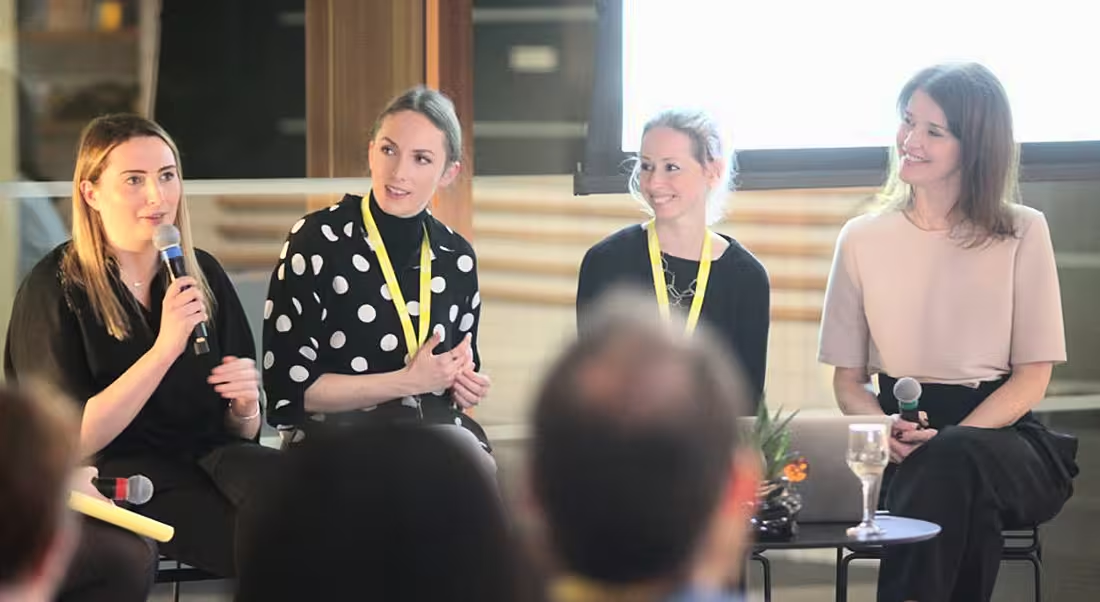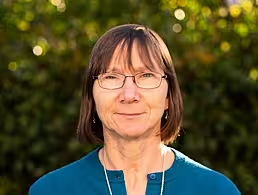At Slack’s ‘The Future Is …’ event, people gathered to contemplate how the future could be better for women across the world.
On 30 November, people came together at Slack’s chic Hatch Street offices to contemplate one vital question: what will the future be for women, and what can be done in the present to effect the change needed to get to that future?
While the organisers were keen to encourage general discussion, handing out canapés and drinks in the hopes of fostering those chance connections women can forge, which have often blossomed into paradigm-shifting innovation, the locus of the event was four women – Emma McCabe, Elva Carri, Jennie McGinn and Chiara Henderson – who are leading the charge in creating a better future, not just for women, but for everyone.
Image: Luke Maxwell
Emma McCabe, senior product researcher at Intercom
“I think the future,” Emma McCabe began, “is research.”
McCabe is a senior product researcher at Intercom. As one might expect, her work has shaped her projection of times to come. It is her job to help companies make evidence-based decisions about their products.“Not assumptions, not feelings – evidence.”
She said: “We’ve all been there, we all have our favourite service, app [or] thing that is designed terribly, and we love to give out about it, and we love to say, ‘Ugh, why doesn’t this work the way that it should work?’
“Usually, what I’m thinking is, ‘Do they even test this with real people?’
“More than likely, that’s not the case, so that’s where product research comes in, because it helps reduce the risk of one of those situations happening.”
Emma McCabe, Intercom. Image: Luke Maxwell
McCabe made it clear that a large amount of wasted resources and time put into products that simply don’t achieve their aims is a needless, avoidable tragedy. “Companies spend major money building things that don’t get used and get thrown in the trash.
“I don’t know if you’ve seen this week all of the bike shares that got thrown into a big heap in China – that’s a prime example. It’s very big, but [things like that are] happening every single day.
“This is where research comes in, because most successful things out there are successful because companies have learned; they’ve learned what works, what doesn’t work, where things can be successful or not – and that’s what research is, it’s providing that learning.
“You don’t really need a lab or crazy money to get started with research, you don’t have to invest thousands and thousands of euros, but you should be asking questions about what you build.
“It doesn’t have to be this clunky, slow process … Investing in research, I think, is investing in your product’s future.
“That sounds corny, but I honestly do believe it. And I think that if you do invest in research in your company, you are going to change the way things on the internet work for the better in the future.”
Elva Carri, founder of GirlCrew
A few years ago, Elva Carri found herself sitting in on a Friday night wanting to go out dancing. Everyone in her immediate circle, however, was busy.
Tinder at this stage had taken people by storm, using online technologies to streamline how people meet romantically. Why not, Carri thought, use it platonically to find some girls to hit the town with?
It was through this spark that GirlCrew was born, an idea first rolled out via use of Facebook groups, which has now been transformed into an app that allows women to create positive female friendships. From this, one may wonder what Carri imagined the future to look like. “Rich,” she said.
“I decided to go with ‘rich’ because I think equality and diversity are two big parts of what I do for my job but also my biggest ambitions in the world.
Elva Carri, GirlCrew. Image: Luke Maxwell
“What I have seen in GirlCrew is a glimpse to this rich future, which is what a community of women – unimpeded by, maybe, concerns that they’re held back by, in situations where there are men looking on – do: incredible things, help each other out, be really brave, be brave about the vulnerable things as well as the things that they’re amazing at.”
“My approach for solving the problem is a little bit like a start-up. Let’s take a huge market opportunity and solve it in a scalable way.
“Women aged 15 to 45 are more likely to be maimed or die from male violence than from cancer, malaria, traffic accidents and war combined,” Carri explained, referring to statistics cited by Pulitzer Prize-winning journalist Nicholas Kristof.
“Weapons experts in the Pentagon have said that, ideologically, if they could, they would use rape as a weapon of war because it leads to a destruction of community.
“What I took from that learning is that if a very extreme case of gender imbalance or gender inequality can have such an incredible effect on our entire community, how must it impact our communities, the everyday sexism that many women face and that people face for all sorts of unconscious bias?
“The incredible thing about attitudes is that the change is scalable. We don’t even have to change anything we’re doing, we just have to change how we do it, so it’s really simple to incorporate that change into our lives, into our careers, into our hiring decisions and into our social situations.”
Jennie McGinn, fashion entrepreneur and Opsh co-founder
Jennie McGinn was about to apologise for needing notes, as she normally has presentations learned off. Instead, she said: “But I decided, based on the theme of my talk, that I’m not going to apologise. I have notes, I need to use them.”
McGinn is a “serial entrepreneur” and her most recent venture was the fashion start-up Opsh, which she founded with her sisters.
As hard as the sisters worked, and as much as they dazzled investors and secured funding, things were not written in the stars for Opsh, and the company had to be “wound down”. She added: “In the middle of that, I found out I was pregnant.”
Now, McGinn finds herself about to return to the workforce “both as a new mum and as somebody who is going back to work for somebody else”.
McGinn ran an informal poll of her social network, asking those around her about the greatest challenges facing women in the workforce. The results were, though anecdotal, fascinating and illuminating.
Jennie McGinn. Image: Luke Maxwell
She spoke about hurdles and the three themes that manifested in her casual research. The first was the perception of “aggressive women” in the workplace, “particularly at a senior level”.
“It’s the perception that women have to fight for their territory, as they work so hard to achieve it.”
Female bullying, she reported with sadness, also emerged as a frequent obstacle to women in the workforce.
Circling back to the topic of motherhood, McGinn noted that “inflexible working environments” were also cited by her peers. “Creating environments that don’t support mothers is a disincentive for mothers to push themselves forward.
“Things like Slack make remote working so easy, and they’re the type of working environments we need to foster to make sure women and men can participate equally in the workforce.”
Mansplaining, the term initially pioneered by polemicist Rebecca Solnit in her book Men Explain Things to Me, also arose – a term that has been a hot-button issue in the media in recent times. “Sometimes, very intelligent men can dismiss very intelligent women’s opinions without realising.”
McGinn returned to the issue of chronic apologies. “Women seem to apologise all the time; we have to appear not too pushy, always nice and always apologising. ‘Sorry, could you mind’ or ‘Sorry, could I just say’, ‘Sorry, I was actually thinking’ – this is something that we just need to cut out.”
“If we don’t ask, we don’t get. If we don’t speak up, no one knows. If we don’t practise it, no one notices it.”
“So, whatever you’re doing, always make sure you are being a woman to watch in the workforce.”
Chiara Henderson, head of customer experience at Slack
Chiara Henderson kicked off her segment of the evening by giving a nod to McGinn’s talk, which resonated with her. Henderson, who is a mother of two, said: “I was on maternity leave when Slack contacted me. It took me probably about a month to reply because I was so exhausted.”
“I started my first job in 20 years as a mom. I had no idea what that entailed. All the coping techniques I had before, the working all hours, the catching up after hours – none of those were at my disposal.”
In a serendipitous turn, however, the company she works for was also the one providing a solution that made her return to the workforce far simpler.
Chiara Henderson. Image: Luke Maxwell
When Henderson joined Slack, she was immediately added to a Slack channel created just for parents. “You go in there with all your horror stories about who swallowed that, and what showed up on x-rays, and how to get that out of that.
“You get advice about potty training and sleep deprivation.”
“It’s great to have that support, and it’s such a leveller. [Everyone is in there] from our founders all the way to the most junior members of our team.”
“I don’t know if anyone in here will be familiar with the idea of an email chain,” Henderson began “but it starts small.” As more are added to the conversation, the waters get muddied. Any clear concept of what the email was even about gets mired in a swamp of ‘Fwd: Fwd: Fwd’, repeating like Fibonacci numbers.
Slack, Henderson explains, simplifies this. “If your thoughts on this particular subject are relevant, well, you’ll already be on the channel [on which it is posted].” This can streamline who receives the message, while emoji reactions cut down on the unnecessary clutter that individual replies can create.
“It’s moving from the whole idea of email being a cover-your-ass to the idea of trust and ownership.
“It’s a huge change for our customer but they find that when they make that change, it’s worth it.”
Want to work at Slack? Check out the Slack Careers page for current vacancies.




